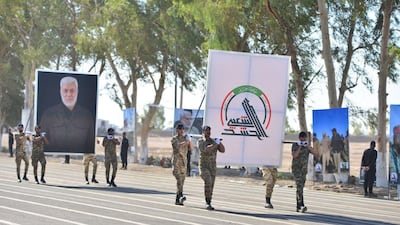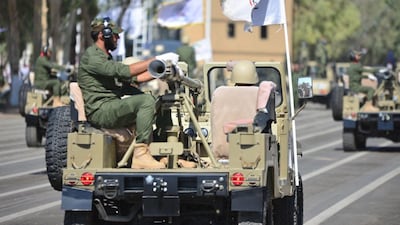Three rockets landed near an oil refinery in Iraq's northern autonomous Kurdistan region but no casualties or material damage were reported.
The rockets fell near the Kawergosk refinery, one of the largest in the oil-rich area, about 20 kilometres north-west of regional capital Erbil, Kurdish counter-terrorism forces said.
No one claimed responsibility for Wednesday's attack.
"The rockets were launched from Khazir area in Mosul," the forces said.
It comes less than a month after Iran's Revolutionary Guard claimed an assault on Erbil that it said targeted an Israeli "strategic centre".
The Iranian forces fired a dozen ballistic missiles in the March 13 attack, which caused extensive damage to buildings but did not cause any deaths.
Kurdish authorities have insisted that Israel has no sites in and around Erbil.
Sources in the Kurdistan Regional Government (KRG) told Reuters that the refinery is owned by Iraqi Kurdish businessman Baz Karim Barzanji, the chief executive of a major domestic energy company called KAR Group and whose home was hit in the Iranian ballistic missile attack last month.
Militia threats
Iran-backed militia groups in Iraq have launched numerous drone and rocket attacks in recent months, several of which have targeted the Kurdish region.
Aside from accusations that the Kurdish Democratic Party (KDP) in Erbil has been working covertly with Israel, Iran-backed groups have threatened the KDP for teaming up with Shiite cleric Moqtada Al Sadr, whose political alliance is poised to form the next Iraqi government.
Iran-backed parties, several of which have militia wings, suffered significant losses in October's elections but have attempted to pressure the parties that won the most seats, including the KDP, Mr Al Sadr's supporters and an alliance of Sunni parties, to hand them concessions in a new government.
Denouncing what they call a "majority government" formed by Mr Al Sadr, the Iran-backed parties, including the Fatah Alliance and former prime minister Nouri Al Maliki's State of Law Coalition have implied that violence could ensue if a compromise is not reached.
Sunni Speaker of Parliament Mohammed Al Halbousi, who is allied to Mr Al Sadr, sitting Prime Minister Mustafa Al Kadhimi and members of the KDP have all been the subject of assassination attempts blamed by some on Iran-backed groups.
Rocket attacks
The mayor of Kawergosk told Kurdish news outlet Rudaw that the devices fired on Wednesday were "Katyusha" rockets, a nickname from the Second World War for Russian rocket artillery.
Iran-backed militias in Iraq, and to a lesser extent ISIS, frequently use similar weapons also called Katyushas, which are actually Iranian unguided – or Fajr – rockets, based on the Russian Grad model.
Iraqi forces have seized scores of the distinctive Iranian-made rockets in recent years, often because some had failed to launch. The militias make no effort to hide the missiles' Iranian origins, leaving factory markings inscribed on the casings.
On March 16, Iran-backed militia in Iraq Harakat Hezbollah Al Nujaba released a Kurdish-language video warning the KDP not to become an ally of the United States. A US military base near Erbil International Airport was struck by rockets in October, after warnings from militias.
The KDP's alliance with the US had "failed to bring security to the region but also rendered it a legitimate target for the factions who oppose the American occupation", the militia warned in its message, translated by the Washington Institute for Near East Policy.













